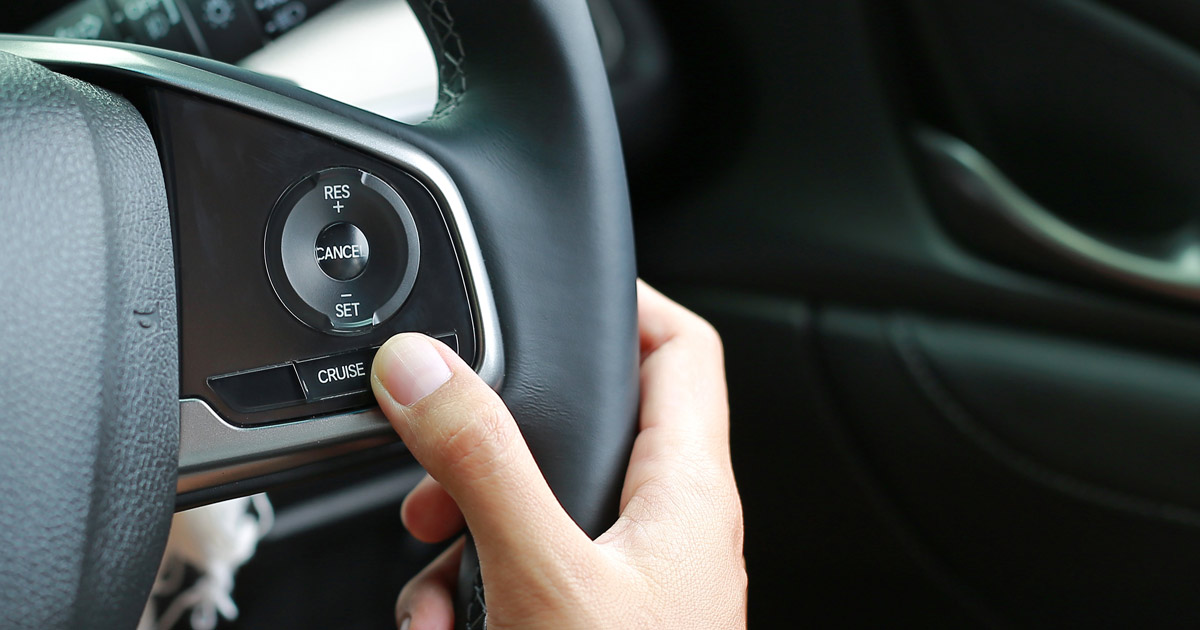According to the National Highway Traffic Safety Administration (NHTSA), in 2018, speed was a factor in 26 percent of all fatal car accidents in the United States and continues to be a contributing factor in collisions. Studies now suggest that driver assistance technologies encourages speeding. A new Insurance Institute for Highway Safety (IIHS) study indicates that 24 percent of drivers are more likely to speed when using adaptive cruise control (ACC) and other driver assist technologies.
What is ACC?
ACC was first developed in 1990. Once relegated to high-end luxury vehicles, ACC has since become widely available in most affordable vehicles. How ACC works is the driver sets the distance they want to remain behind the car ahead. ACC utilizes a radar in the vehicle’s front grill to scan vehicles up to 500 feet away and determines how fast they are traveling and automatically adjusts the speed accordingly to the preset trailing distance.
If the car in front slows down, ACC automatically slows down as well. If the driver moves to an open lane, ACC adjusts the speed to meet the driver’s preferred maximum speed. The most advanced ACC systems adapt speed according to local posted speed limits, and it even decelerates around curves and turns.
What are the Benefits of ACC?
If ACC is used effectively, it is a helpful tool, especially for drivers who spend a large part of their day stuck in the morning or evening commute. However, additional research also points to the risks associated with autonomous speed control. Many modern ACC systems allow the user to preset a desired maximum speed over the legal speed limit. Also, many ACC systems designed to function well in straightforward highway traffic are not designed to handle other real-world driving scenarios.
Researchers from the IIHS conducted a study to assess driver behavior with ACC assistance. They found that drivers are 24 percent more likely to speed on limited-access roads when using ACC. In 55 miles per hour zones, motorists tended to speed around eight miles per hour above the posted speed limit. In 60 and 65 miles per house zones, drivers in the study exceeded the speed limit by an average of five miles per hour.
What are the Dangers of Speeding?
Based on the IIHS study, drivers are more prone to speed when using autonomous cruise control technology. The faster a large object is traveling, the greater force it carries when it impacts with another object. That force is transferred to the human passengers inside both vehicles, possibly causing serious car accident injuries.
High speeds also reduce the time the driver has to assess impeding hazards and react accordingly. Imagine driving down a suburban street when a dog runs out in front of the vehicle. It is much easier to suddenly stop a car moving at 30 miles per hour than it is at 50 miles per hour. Maintaining a safe speed allows the driver to better maintain control and make sound decisions to avoid accidents and prevent injuries.
What Should I Do if I am Hit by a Speeding Driver?
Despite the availability of auto safety technology, accidents are not entirely preventable. Drivers may not use ACC or misuse it in a way that encourages speeding. After a motor vehicle accident with a speeding or aggressive driver, a motorist should take the following steps to protect their rights and preserve evidence for a possible personal injury lawsuit.
Assess the Scene
Immediately after a motor vehicle crash, the first step is to assess the scene and determine if anyone involved is in grave danger. Never move anyone who may be hurt. Doing so can exacerbate injuries and cause permanent damage. If the vehicle is in danger of being hit, move it safely out of traffic until help arrives.
Call for Help
After checking for injuries and moving the vehicle, call for help right away. Relay helpful information to the dispatcher, including the location, what happened, and how many people were involved. Never leave the scene of an accident. Wait for the police to speak to everyone and clear the scene.
Gather Evidence
The moments after a traffic accident can be chaotic and even frightening, but it is important to stay calm and take time to document the scene. Take photographs of the accident site, hazardous road conditions, and all vehicles involved. Photographs of injuries are important as well. Take down the other driver’s license plate number and contact information as well as information from any individuals who may have witnessed the accident.
File a Police Report
Calmly and truthfully explain exactly what happened in the moments leading up to the accident. While it is not helpful to presume anything about the other driver’s behavior, it is important to tell police if they were driving recklessly prior to the accident. Tell the police if the other driver was speeding, tailgating, drifting in and out of the lane, or using a cellphone behind the wheel.
Do not speak with the other driver or their insurance company. What one says to police, car accident lawyers, and insurance companies after a car accident can be used against them. Avoid speaking with the other driver’s insurance company or lawyer without legal representation.
It is important to remember that the insurance company wants to pay out as little as possible and will often offer a quick settlement for an amount that is less than what the injured victim deserves. Resist agreeing to an initial offer before meeting with a lawyer to discuss the legal options available.
See a Doctor
Anyone with serious injuries after an accident must receive immediate emergency care. Some common car accident injuries are not immediately obvious. Victims may not notice whiplash, internal bleeding, or brain injuries, especially if they are in shock.
It is common for aches, pains, and other symptoms to develop in the hours and days following a wreck. For this reason, it is always a good idea to get a full check-up with a trusted physician in a timely manner to rule out any serious injuries.
Contact a Lawyer
After filing a police report and going to a doctor, a consultation with a trusted car accident lawyer is the next step. Many people who have never been in a car accident do not realize the costs. Beyond the medical bills and auto repair bills, someone who is seriously hurt probably cannot return to work for a while, which means lost income.
An experienced lawyer reviews the facts of the case and explains all of the legal options available to their client. A lawyer helps the accident victim make informed decisions about the right path to take, whether that is an insurance settlement or taking the case to court.
Drivers have many innovative tools and technologies at their disposal. While auto features are designed to make driving safer, some people misuse these systems. If a driver is hit by a negligent motorist, they should speak to a lawyer right away.
Virginia Beach Car Accident Lawyers Represent Clients Dealing with Life-Changing Injuries After Speed-Related Collisions
ACC can be beneficial if it is used properly. Some drivers misuse this feature, which can be dangerous. If you were injured by a speeding motorist, a Virginia Beach car accident lawyer can help. At East Coast Trial Lawyers, we know how car accidents emotionally, physically, and financially impact victims. For more information about your case and a free consultation, call us at 757-352-2237 or contact us online. Located in Virginia Beach, Virginia, we serve clients throughout Chesapeake, Eastern Shore, Hampton, Newport News, Norfolk, Portsmouth, and Suffolk, Virginia, as well as North Carolina and nationwide.


